South Korean security officials may visit North Korea to finalise details ahead for the first summit since 2007, where the South hopes the North will confirm a commitment to give up its nuclear programme, a South Korean official said on Tuesday.
Lawmakers from the neighboring states are thought to be negotiating the details of a joint statement that could outline an official end to the confrontation, CNBC cited the daily newspaper Munhwa Ilbo as reporting Tuesday, citing an unnamed South Korean official.
After meeting North Korean leader Kim Jong Un in Pyongyang in March, South Korea's national security adviser and spy chief said Kim was committed to denuclearising the Korean peninsula and had expressed a willingness to meet U.S. President Donald Trump.
The two sides are due to hold "working-level" talks on Wednesday and then South Korea's intelligence chief, Suh Hoon, or its national security adviser, Chung Eui-yong, could visit the North to finish off preparations, if deemed necessary, South Korean presidential chief of staff, Im Jong-seok, told reporters.
Pyongyang and Seoul have technically been at war since the 1950-1953 Korean conflict ended with a truce and not a peace treaty.
The April 27 summit between South Korean President Moon Jae-in and Kim is scheduled to take place in the border village of Panmunjom.
That is expected to be followed by a meeting between Kim and Trump in late May or early June, which would mark the first meeting between sitting leaders of the two countries.
"Even though our special envoys confirmed his denuclearisation will, it is entirely different if the two leaders confirm it directly among themselves and put that into text," Im said.
"We expect the summit will confirm the denuclearisation will (of North Korea), and hope to have a comprehensive agreement with the North on the matter," he said.
Reclusive North Korea has been pursuing nuclear and missile programmes in defiance of U.N. Security Council sanctions. It conducted its most powerful nuclear test last year and has sought to develop a missile capable of hitting the U.S. mainland.
But Kim has changed course since the beginning of the year, sending a delegation to the Winter Olympics held in South Korea in February and agreeing to discuss with South Korea and the United States a nuclear programmes the North has defended as a necessary deterrent against U.S. invasion.
The two Koreas are discussing the wording of a joint statement that could be released at the summit, Im said.
Three-way summit?
Moon has been reviewing a framework of the statement which could be called the April 27 declaration or the Panmunjom declaration, he said.
The statement would likely focus on issues of denuclearisation and peace on the Korean peninsula, and an improvement in relations not only between the two Koreas but also with other countries including the United States.
"This summit is significant because it will set the stage for the North Korea-U.S. summit, and even a possible three-way summit between the countries," Im said.
"Without U.S. support and agreement, it will be difficult to follow through on inter-Korean agreements."
Any joint statement is unlikely to include economic cooperation with the North, Im said.
U.N. Security Council sanctions imposed since North Korea's first nuclear test in 2006 and strengthened over the past decade aim to cut NorthKorea off from international trade.
The two Koreas agreed last month to install a hotline for their leaders to help defuse military tension and facilitate consultation.
The telephone line could be operational by around Friday, but it is not clear when Moon and Kim would use it the first time, Im said.
The two leaders will meet at Peace House, a South Korean building inside Panmunjom, making Kim the first North Korean leader to set foot in the South since the 1950-53 Korean War.
Discussions are underway about live coverage of part of the meeting, Im said.
North Korea and the rich, democratic South are technically still at war because the Korean War ended in a truce, not a peace treaty. The United States stations 28,500 troops in South Korea as a legacy of the conflict.


Spread the word